Unit 8 It must belong to Carla. Section A (1a—2d) 课件(共23张PPT)
文档属性
| 名称 | Unit 8 It must belong to Carla. Section A (1a—2d) 课件(共23张PPT) |
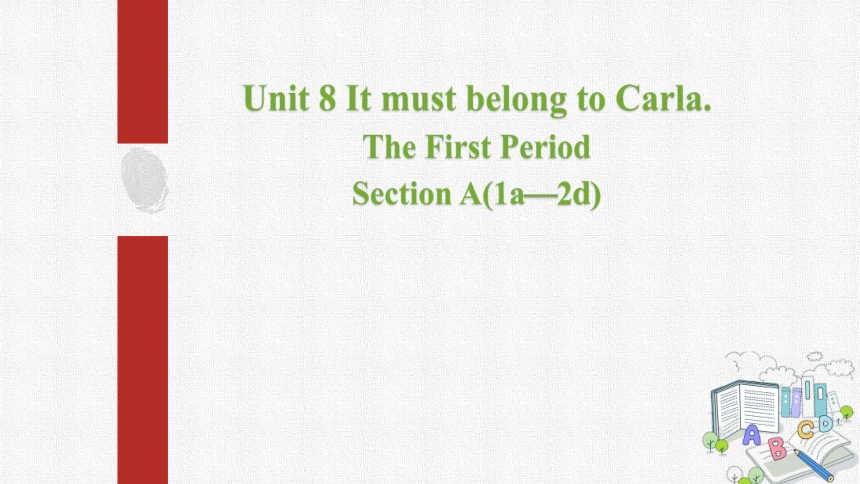
|
|
| 格式 | pptx | ||
| 文件大小 | 13.5MB | ||
| 资源类型 | 教案 | ||
| 版本资源 | 人教新目标(Go for it)版 | ||
| 科目 | 英语 | ||
| 更新时间 | 2025-02-08 09:37:00 | ||
图片预览

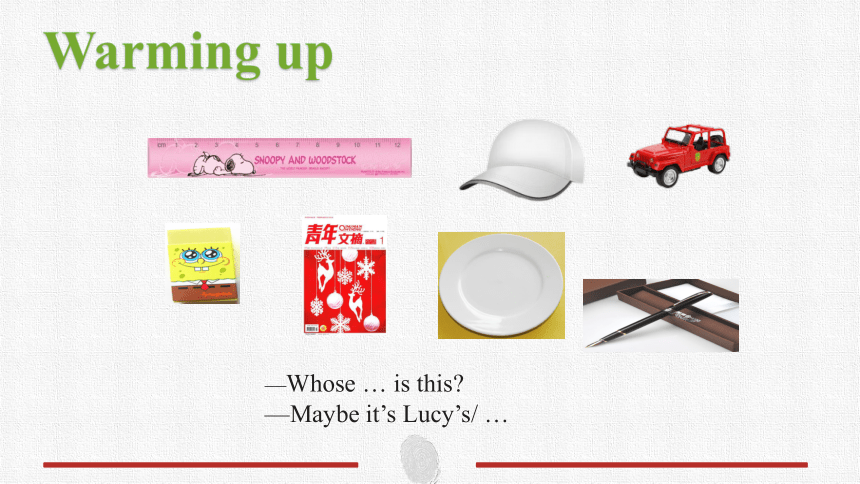

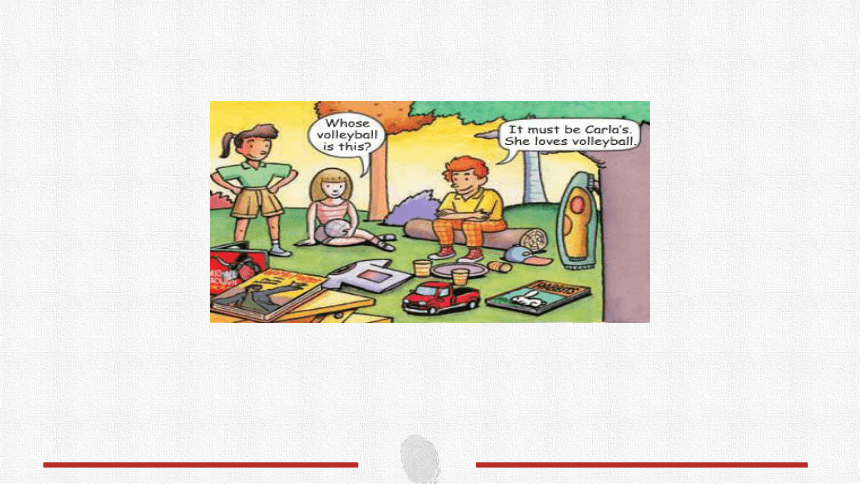
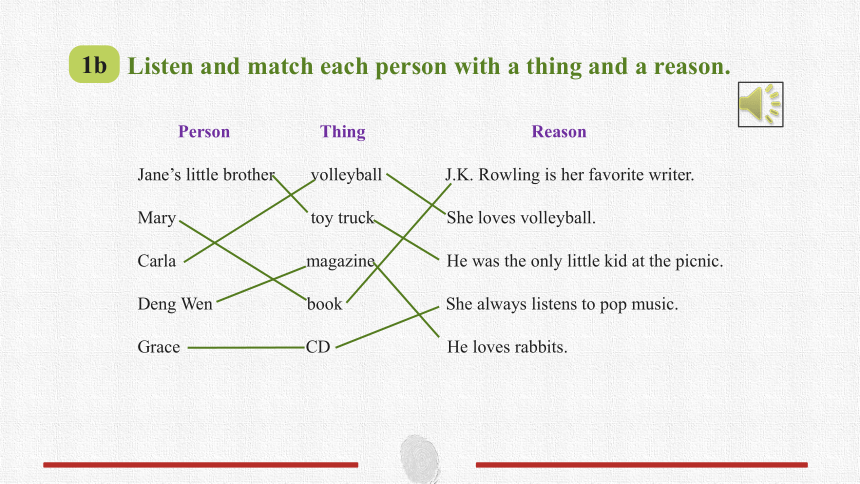

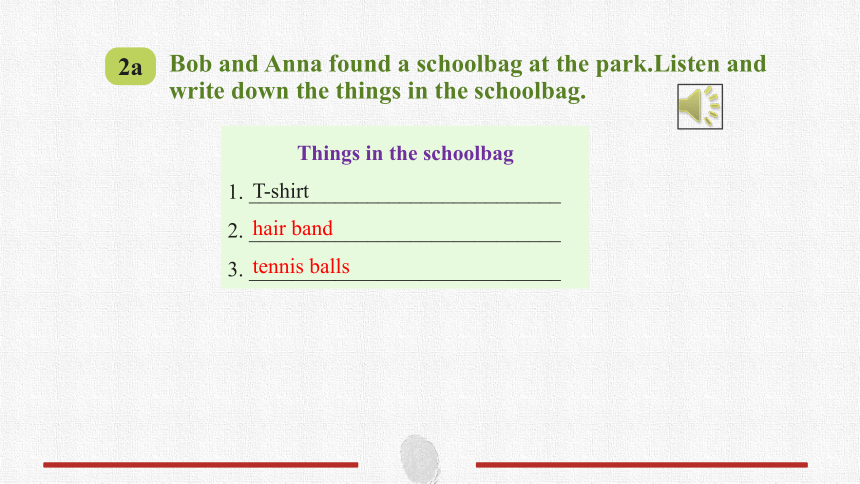
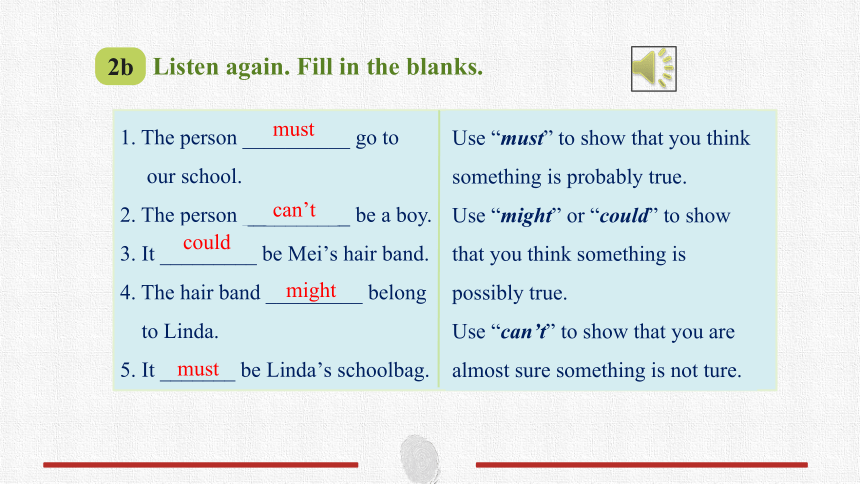
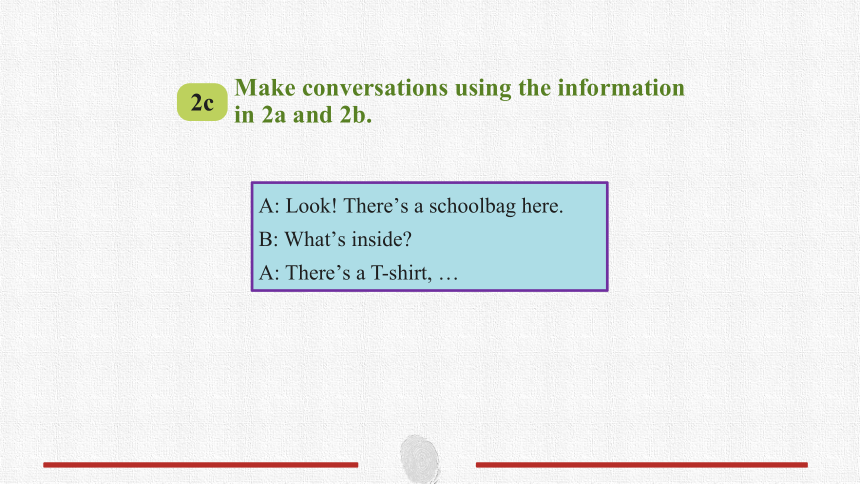
文档简介
(共23张PPT)
Unit 8 It must belong to Carla.
The First Period
Section A(1a—2d)
Warming up
—Whose … is this
—Maybe it’s Lucy’s/ …
Look at the picture. Write the things you see in the correct columns in the chart.
1a
Clothing Fun things Kitchen things
hat volleyball plate
jacket
T-shirt
CD
toy truck
magazine
book
cup
Person Thing Reason
Jane’s little brother volleyball J.K. Rowling is her favorite writer.
Mary toy truck She loves volleyball.
Carla magazine He was the only little kid at the picnic.
Deng Wen book She always listens to pop music.
Grace CD He loves rabbits.
Listen and match each person with a thing and a reason.
1b
Practice the conversation in the picture above.Then
make conversations using the information in 1b.
1c
A: Whose book is this
B: It must be Mary’s. J. K. Rowling is her favorite writer.
Things in the schoolbag
1. _____________________________
2. _____________________________
3. _____________________________
T-shirt
hair band
tennis balls
Bob and Anna found a schoolbag at the park.Listen and write down the things in the schoolbag.
2a
1. The person __________ go to
our school.
2. The person __________ be a boy.
3. It _________ be Mei’s hair band.
4. The hair band _________ belong
to Linda.
5. It _______ be Linda’s schoolbag.
Use “must” to show that you think something is probably true.
Use “might” or “could” to show that you think something is possibly true.
Use “can’t” to show that you are almost sure something is not ture.
must
can’t
could
might
must
Listen again. Fill in the blanks.
2b
Make conversations using the information in 2a and 2b.
2c
A: Look! There’s a schoolbag here.
B: What’s inside
A: There’s a T-shirt, …
Linda: Mom, I’m really worried.
Mom: Why What’s wrong
Linda: I can’t find my schoolbag.
Mom: Well, where did you last put it
Linda: I can’t remember! I attended a concert yesterday so
it might still be in the music hall.
Role-play the conversation.
2d
Mom: Do you have anything valuable in your schoolbag
Linda: No, just my books, my pink hair band and some tennis balls.
Mom: So it can’t be stolen.
Linda: Oh, wait! I went to a picnic after the concert. I remember I had
my schoolbag with me at the picnic.
Mom: So could it still be at the park
Linda: Yes. I left early, before the rest of my friends.I think somebody
must have picked it up. I’ll call them now to check if anybody
has it.
1. —Whose volleyball is this 这是谁的排球?
—It must be Carla’s. She loves volleyball. 它一定是卡拉的。她喜欢
排球。(教材第57页)
(1) 此处 must 表肯定推测,语气比较强,意为“一定,肯定”,通常与 be 连用,这种用法只用于肯定句中。
e.g. There must be something wrong with the computer. 这台电脑一定 是出了什么毛病。
Language Points
(2) must 表示“必须”,可用于肯定句、否定句或疑问句中,用在疑问句
中时,肯定回答用 must,否定回答用 needn’t 或 don’t need to;用于否定句中时,mustn’t 的意思是“一定不要,禁止”。
e.g. We must find a good way to learn English well. 我们必须找到一个学好英语的好方法。
You mustn’t play soccer in the square. 你们一定不能在广场上踢足球。
—Must I clean the classroom 我必须打扫教室吗?
—Yes, you must.(No, you needn’t. /No, you don’t have to.)是的,
你必须(不,你不必)。
2. He was the only little kid at the picnic. 他是野餐中唯一的小孩。(教材第57页)
(1) only 此处用作形容词,意为“唯一的,仅有的”,用来修饰名 词。
e.g. She is the only girl in her group. 她是组里唯一的女孩。
(2) picnic 名词,意为“野餐”。常构成短语:go for a picnic 去野 餐;
at the picnic 在野餐中;have a picnic 野餐。
e.g. We went to the beach for a picnic. 我们去沙滩野餐了。
3. The person can’t be a boy. 那个人一定不是男孩。(教材第58页)
can’t 表示否定的推测,意为 “一定不”。
e.g. He can’t finish his work in two hours. 他两个小时完不成工作。
She had some bread ten minutes ago, so she can’t be hungry now. 她十分钟前吃了一些面包,所以她现在 一定不饿。
4. It could be Mei’s hair band. 它可能是梅的发带。(教材第58页)
could 表示推测,语气比较弱,可用于表示某事有可能发生或可能是事实。
e.g. Jack could be late because of the heavy rain. 杰克可能因为大雨而迟到。
5. The hair band might belong to Linda. 这条发带可能属于琳达。(教
材第58页)
(1) might 表示推测,语气最弱,意为“可能,也许”,其否定形式 might not 意为“可能不,也许不”。
e.g. He might be in the office. 他可能在办公室。
She might not go to Beijing this weekend. 她这周末可能不去北京。
(2) belong to …意为“属于……”,belong 此处作不及物动词,to 为介词,后接名词或人称代词的宾格形式,不能接名词性物主代词或名词所有格。
e.g. That book belongs to me. 那本书属于我。
These clothes must belong to Tom.=These clothes must be Tom’s.
这些衣服一定是汤姆的。
注意:
① belong to 不能用于进行时态和被动语态。
②在表示“属于某人,归某人所有”时,belong to sb. 和 be sb.’s 含义相同,但用法不同。belong to + 名词或人称代词的宾格形式,be +名词所有格或名词性物主代词。
e.g. The book must belong to Tom.=The book must be Tom’s (book).
这本书一定是汤姆的。
6. Do you have anything valuable in your schoolbag 你的书包里有
贵重物品吗 (教材第58页)
形容词修饰不定代词放在所修饰词的后面。
e.g. something important 重要的事情
7. I think somebody must have picked it up. 我想有人一定捡到它了。
(教材第58页)
(1) 情态动词+have+动词的过去分词,是对过去事情的推测,表示过去一定/可能/不可能发生的动作。
(2) pick it up 意为“把它拾起”。it是代词作宾语,放在 up 之前。
8. I’ll call them now to check if anybody has it. 我现在就打电话去查
一下是否有人捡到它。(教材第58页)
(1) anybody/anyone 意为“有人”(用于否定句及疑问句中,也可用于条件状语从句中),此句中的 anybody 用于由一般疑问句转换的宾语从句中。
(2) anybody/anyone 意为“任何人”。用于各种句式中。
一、用 must, might, could, can’t 填空
1. The textbook _________ be his. It has his name on it.
2. The trousers _________ be Jim’s. They are too long.
3. —What are you going to do this Sunday
—I _____________ stay at home or go to the park.
4. The toy _________ be Bob’s. He is the only little kid.
must
can’t
might/could
must
Exercise
二、根据汉语提示完成句子
1. 这个手表可能属于迈克。
The watch _______ _________ ______ Mike.
2. 我妹妹不可能在教室里,她去图书馆了。
My sister ________ _______ in the classroom.She has gone to the library.
3. 我认为这串钥匙一定是保罗的。
I think this set of keys ________ ______ Paul’s/belong to Paul.
might belong to
can’t be
must be
1. Listen and read after the tape at home.
2. Read and recite 2d.
Homework
Unit 8 It must belong to Carla.
The First Period
Section A(1a—2d)
Warming up
—Whose … is this
—Maybe it’s Lucy’s/ …
Look at the picture. Write the things you see in the correct columns in the chart.
1a
Clothing Fun things Kitchen things
hat volleyball plate
jacket
T-shirt
CD
toy truck
magazine
book
cup
Person Thing Reason
Jane’s little brother volleyball J.K. Rowling is her favorite writer.
Mary toy truck She loves volleyball.
Carla magazine He was the only little kid at the picnic.
Deng Wen book She always listens to pop music.
Grace CD He loves rabbits.
Listen and match each person with a thing and a reason.
1b
Practice the conversation in the picture above.Then
make conversations using the information in 1b.
1c
A: Whose book is this
B: It must be Mary’s. J. K. Rowling is her favorite writer.
Things in the schoolbag
1. _____________________________
2. _____________________________
3. _____________________________
T-shirt
hair band
tennis balls
Bob and Anna found a schoolbag at the park.Listen and write down the things in the schoolbag.
2a
1. The person __________ go to
our school.
2. The person __________ be a boy.
3. It _________ be Mei’s hair band.
4. The hair band _________ belong
to Linda.
5. It _______ be Linda’s schoolbag.
Use “must” to show that you think something is probably true.
Use “might” or “could” to show that you think something is possibly true.
Use “can’t” to show that you are almost sure something is not ture.
must
can’t
could
might
must
Listen again. Fill in the blanks.
2b
Make conversations using the information in 2a and 2b.
2c
A: Look! There’s a schoolbag here.
B: What’s inside
A: There’s a T-shirt, …
Linda: Mom, I’m really worried.
Mom: Why What’s wrong
Linda: I can’t find my schoolbag.
Mom: Well, where did you last put it
Linda: I can’t remember! I attended a concert yesterday so
it might still be in the music hall.
Role-play the conversation.
2d
Mom: Do you have anything valuable in your schoolbag
Linda: No, just my books, my pink hair band and some tennis balls.
Mom: So it can’t be stolen.
Linda: Oh, wait! I went to a picnic after the concert. I remember I had
my schoolbag with me at the picnic.
Mom: So could it still be at the park
Linda: Yes. I left early, before the rest of my friends.I think somebody
must have picked it up. I’ll call them now to check if anybody
has it.
1. —Whose volleyball is this 这是谁的排球?
—It must be Carla’s. She loves volleyball. 它一定是卡拉的。她喜欢
排球。(教材第57页)
(1) 此处 must 表肯定推测,语气比较强,意为“一定,肯定”,通常与 be 连用,这种用法只用于肯定句中。
e.g. There must be something wrong with the computer. 这台电脑一定 是出了什么毛病。
Language Points
(2) must 表示“必须”,可用于肯定句、否定句或疑问句中,用在疑问句
中时,肯定回答用 must,否定回答用 needn’t 或 don’t need to;用于否定句中时,mustn’t 的意思是“一定不要,禁止”。
e.g. We must find a good way to learn English well. 我们必须找到一个学好英语的好方法。
You mustn’t play soccer in the square. 你们一定不能在广场上踢足球。
—Must I clean the classroom 我必须打扫教室吗?
—Yes, you must.(No, you needn’t. /No, you don’t have to.)是的,
你必须(不,你不必)。
2. He was the only little kid at the picnic. 他是野餐中唯一的小孩。(教材第57页)
(1) only 此处用作形容词,意为“唯一的,仅有的”,用来修饰名 词。
e.g. She is the only girl in her group. 她是组里唯一的女孩。
(2) picnic 名词,意为“野餐”。常构成短语:go for a picnic 去野 餐;
at the picnic 在野餐中;have a picnic 野餐。
e.g. We went to the beach for a picnic. 我们去沙滩野餐了。
3. The person can’t be a boy. 那个人一定不是男孩。(教材第58页)
can’t 表示否定的推测,意为 “一定不”。
e.g. He can’t finish his work in two hours. 他两个小时完不成工作。
She had some bread ten minutes ago, so she can’t be hungry now. 她十分钟前吃了一些面包,所以她现在 一定不饿。
4. It could be Mei’s hair band. 它可能是梅的发带。(教材第58页)
could 表示推测,语气比较弱,可用于表示某事有可能发生或可能是事实。
e.g. Jack could be late because of the heavy rain. 杰克可能因为大雨而迟到。
5. The hair band might belong to Linda. 这条发带可能属于琳达。(教
材第58页)
(1) might 表示推测,语气最弱,意为“可能,也许”,其否定形式 might not 意为“可能不,也许不”。
e.g. He might be in the office. 他可能在办公室。
She might not go to Beijing this weekend. 她这周末可能不去北京。
(2) belong to …意为“属于……”,belong 此处作不及物动词,to 为介词,后接名词或人称代词的宾格形式,不能接名词性物主代词或名词所有格。
e.g. That book belongs to me. 那本书属于我。
These clothes must belong to Tom.=These clothes must be Tom’s.
这些衣服一定是汤姆的。
注意:
① belong to 不能用于进行时态和被动语态。
②在表示“属于某人,归某人所有”时,belong to sb. 和 be sb.’s 含义相同,但用法不同。belong to + 名词或人称代词的宾格形式,be +名词所有格或名词性物主代词。
e.g. The book must belong to Tom.=The book must be Tom’s (book).
这本书一定是汤姆的。
6. Do you have anything valuable in your schoolbag 你的书包里有
贵重物品吗 (教材第58页)
形容词修饰不定代词放在所修饰词的后面。
e.g. something important 重要的事情
7. I think somebody must have picked it up. 我想有人一定捡到它了。
(教材第58页)
(1) 情态动词+have+动词的过去分词,是对过去事情的推测,表示过去一定/可能/不可能发生的动作。
(2) pick it up 意为“把它拾起”。it是代词作宾语,放在 up 之前。
8. I’ll call them now to check if anybody has it. 我现在就打电话去查
一下是否有人捡到它。(教材第58页)
(1) anybody/anyone 意为“有人”(用于否定句及疑问句中,也可用于条件状语从句中),此句中的 anybody 用于由一般疑问句转换的宾语从句中。
(2) anybody/anyone 意为“任何人”。用于各种句式中。
一、用 must, might, could, can’t 填空
1. The textbook _________ be his. It has his name on it.
2. The trousers _________ be Jim’s. They are too long.
3. —What are you going to do this Sunday
—I _____________ stay at home or go to the park.
4. The toy _________ be Bob’s. He is the only little kid.
must
can’t
might/could
must
Exercise
二、根据汉语提示完成句子
1. 这个手表可能属于迈克。
The watch _______ _________ ______ Mike.
2. 我妹妹不可能在教室里,她去图书馆了。
My sister ________ _______ in the classroom.She has gone to the library.
3. 我认为这串钥匙一定是保罗的。
I think this set of keys ________ ______ Paul’s/belong to Paul.
might belong to
can’t be
must be
1. Listen and read after the tape at home.
2. Read and recite 2d.
Homework
同课章节目录
- Unit 1 How can we become good learners.
- Section A
- Section B
- Unit 2 I think that mooncakes are delicious!
- Section A
- Section B
- Unit 3 Could you please tell me where the restroom
- Section A
- Section B
- Unit 4 I used to be afraid of the dark.
- Section A
- Section B
- Unit 5 What are the shirts made of?
- Section A
- Section B
- Review of Units 1-5
- Unit 6 When was it invented?
- Section A
- Section B
- Unit 7 Teenagers should be allowed to choose their
- Section A
- Section B
- Unit 8 It must belong to Carla.
- Section A
- Section B
- Unit 9 I like music that I can dance to.
- Section A
- Section B
- Unit 10 You're supposed to shake hands.
- Section A
- Section B
- Review of Units 6-10
- Unit 11 Sad movies make me cry.
- Section A
- Section B
- Unit 12 Life is full of the unexpected
- Section A
- Section B
- Unit 13 We're trying to save the earth!
- Section A
- Section B
- Unit 14 I remember meeting all of you in Grade 7.
- Section A
- Section B
- Review of Units 11-14
